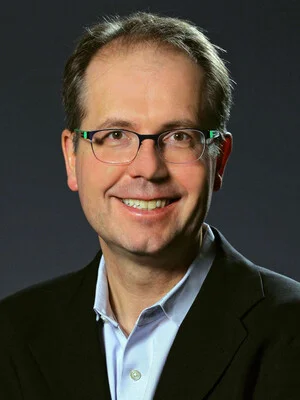
Karsten Heeger, who does field-leading research in the study of neutrinos and neutrino mass, was recently appointed the Eugene Higgins Professor of Physics, effective immediately.
Heeger is a member of Yale’s Faculty of Arts and Sciences, where he is chair in the Department of Physics, and is director of the Yale Wright Laboratory.
In his research, Heeger aims to solve some of the greatest mysteries of the universe: What does the invisible universe consist of? Why does the universe have more matter than anti-matter? What are the properties of neutrinos — the most abundant particles known to have mass in the universe? His cutting-edge experiments have brought humankind closer to the answers to those questions by revealing the properties of neutrinos, identifying rare event processes, and expanding our understanding of the invisible universe.
Heeger joined the Yale faculty in 2013 after serving as a faculty member at the University of Wisconsin and as a Chamberlain Fellow at Lawrence Berkeley National Laboratory. He has played a key role in critical experiments in the field: he was involved in the resolution of the solar neutrino problem with the Sudbury Neutrino Observatory (SNO) which led to the 2015 Nobel Prize in Physics, the first observation of reactor antineutrino oscillation with KamLAND in Japan, and the first measurement of the neutrino mixing angle θ13 with the Daya Bay Reactor neutrino experiment in China.
He is a fellow of the American Physical Society and was co-recipient of the 2016 Breakthrough Prize in Fundamental Physics for his work on SNO, KamLAND, and Daya Bay. He has held an Alfred P. Sloan Foundation research fellowship, a Kavli Fellowship from the National Academy of Sciences, and was recipient of two DOE Outstanding Junior Investigator awards. Heeger has co-authored more than 250 journal articles, which have been published in top journals in the field, and he has been an invited speaker at conferences and seminars around the world.
Heeger is a key figure in scientific initiatives that span the globe. He has served on numerous national and international committees including the High Energy Physics Advisory Panel (HEPAP), the Nuclear Science Advisory Committee (NSAC), the American Physical Society (APS) Committee on International Scientific Affairs, and the APS Division of Particles and Fields (DPF) Executive Committee. He was a member of the 2015 Nuclear Physics Long Range Planning Group, co-chair of the 2021/22 APS Coordinating Panel for Advanced Detectors (CPAD), and recently was appointed deputy chair to the P5 Particle Physics Project Prioritization Panel, a committee charged with developing plans for U.S. particle physics for the next 10 years with a 20 year vision.
At Yale, Heeger has played a key role in the advancement of the university’s scientific infrastructure. He oversaw the transformation of the Wright Nuclear Structure Laboratory into a state-of-the-art experimental facility for fundamental physics. This included the decommissioning of its tandem nuclear accelerator facility, a complete building renovation, as well as construction of expanded modern laboratories and shared technical facilities including an Advanced Prototyping Center. As director of the now-transformed Wright Lab, Heeger stewards a broad scientific program at the frontiers of nuclear, particle, and astrophysics. He has helped advance the university’s instrumentation development initiative, co-organized the Yale Days of Instrumentation, and now serves as co-chair of the university-wide planning committee for Yale’s Physical Sciences and Engineering Building.
He received a bachelor’s degree in physics and master of arts from Oxford, and earned master of science and his Ph.D. in physics from the University of Washington, Seattle (UW).
This story is taken from the Yale News story of May 12, 2023. See below for the link to the original story.